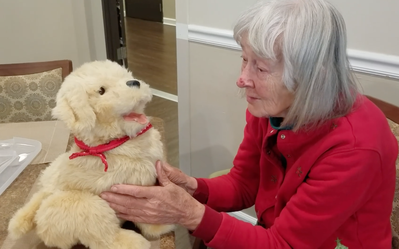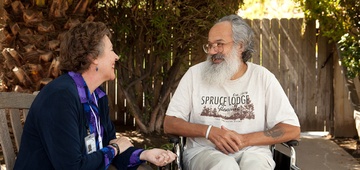
Certified pet therapy dogs have been an integral part of the LightBridge integrative therapy program for many years. Based on the patient's medical needs and preferences, a therapy dog can sometimes be the best medicine to bring a sense of calm and enjoyment to the patient.
The Research
According to Marwan Sabbagh, MD, Director of Cleveland Clinic Lou Ruvo Center for Brain Health, "Simply petting an animal can decrease the level of the stress hormone cortisol and boost the release of the neurotransmitter serotonin, resulting in lowered blood pressure and heart rate and, possibly, in an elevated mood."
The Solution
However, not all patients are able to interact with a live animal. Looking for a solution, LightBridge introduced a new addition to the Pet Therapy program, Robo Dog. These "Robo Dogs" are lifelike mechanical dogs designed to mimic real dogs by responding to sound and touch, but, unlike their live counterparts, they do not shed or cause allergic reactions nor do they require specialized training for their handling. Consequently, visit availability is not limited or restricted so more hospice volunteers can use them with patients.
The Benefit
This type of therapy can have an especially profound effect on patients with Dementia, who may not recognize the difference between a living dog and a robotic one. "What we're seeing is they both have the same effect," shares Sarah Joslyn, Manager of Volunteer Services at LightBridge Hospice. "Some mimic the sounds they make and talk with them. I've had one patient comment 'He's such a good listener!'" Though they're a different type of companion pet, they ultimately can have the same impact on the well being of patients and their families living with dementia.
Sometimes it's family members and caretakers who respond. "A patient's wife was completely overwhelmed by her caretaking duties, and she found interacting with the Robo Dog to be a huge stress-reliever," says Sarah. Not surprisingly, the response from hospice staff and volunteers has been overwhelmingly positive in regards to their health and wellbeing. "Robo dogs occasionally come to staff meetings now," laughs Sarah. "They even help relieve some of the stress of our nurses!" All of these things considered, it is no wonder that LightBridge teams are receiving requests every week for more Robo Dogs.
These Robo Dogs have allowed us to expand the program to benefit even more patients and their caregivers. We are committed to providing the best quality of care to those we serve and will continue the pursuit of innovation in hospice care. Feline lovers will be especially pleased to know robotic cats will be added to the program shortly.
This Pet Therapy program would not be possible without the generous funds from the LightBridge Community Hospice Foundation. To learn how you can support incredible programs like Robo Dog through the Alma G. Wise Integrative Therapy Fund please go to https://lbhcf.org/programs-services/integrative-therapies/



